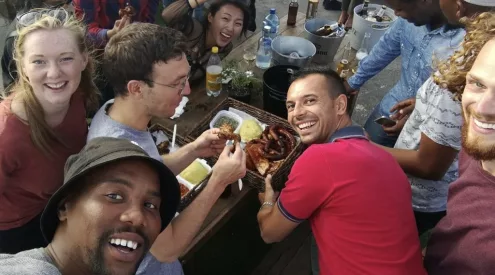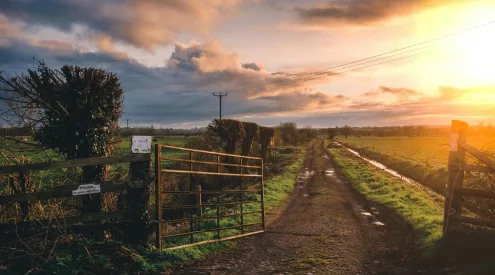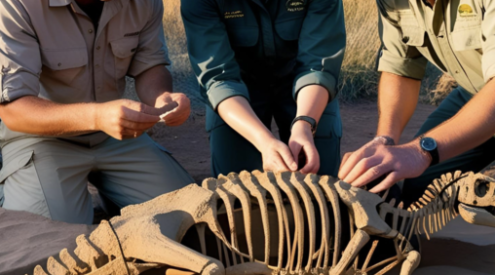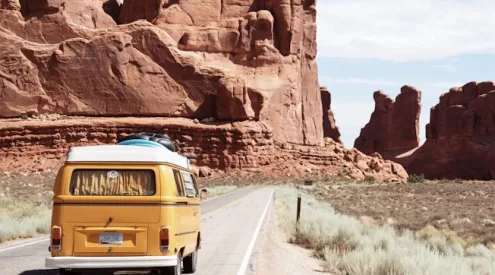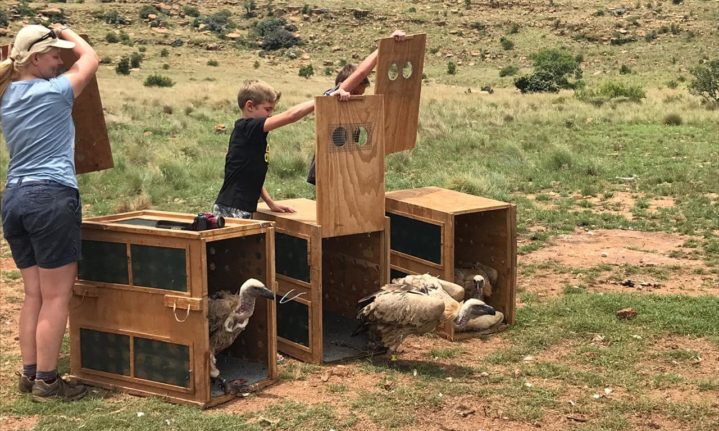Wildlife conservation is essential for protecting the country’s beautiful and often endangered resources.
As a result, college and training programmes which specialise in environmental studies are particularly important for the environment and improving career prospects for both young South Africans and global citizens.
The future and wellbeing of our resources lies in the hands of (extra-)ordinary people, and especially the future generations, so why not lend a hand or consider a career in conservation?

Supplied: Southern African Wildlife College.
Nature-lovers can volunteer at these organisations that have made conservation and eco-training their priority and passion:
Southern African Wildlife College
The Southern African Wildlife College (SAWC) campus is based at the Kempiana Nature Reserve in Hoedspruit, Limpopo.
It offers short courses ranging from a few days to a few weeks, as well as ‘Youth Access’ courses which can be designed as bridging courses and which cover First Aid and leadership training among other practical and theoretical environmental education subjects. The SAWC also offers two year-long courses accredited with the Council on Higher Education.
The college’s Kruger K9 unit was the recent joint winner of the 2018 Kudu Award for its conservation efforts.
SANCCOB
Established in 1968, the Southern African Foundation for the Conservation of Coastal Birds (SANCCOB) is dedicated to seabird rehabilitation. SANCCOB runs internship programmes throughout the year and offers a hands-on experience for committed volunteers and young people. Visit the SANCCOB site for more details.
Centre for Rehabilitation of Wildlife
KwaZulu-Natal’s Centre for Rehabilitation of Wildlife (CROW) was founded 30 years ago and assists over 3,000 animals every year. Volunteers (from 16 years and up) are needed all year-round to help feed and care for hundreds of animals. CROW volunteers are welcome over the weekends or during the school holidays, but spring and summer are CROW’s peak seasons.
While the centre offers a year-long training programme in basic skills and rehabilitation, those with proficiency in other fields are welcome as well. CROW’s three to six-month internship programmes accommodate students (primarily graduates and post-grads) who need experience or would like to get experience in marketing, fundraising, PR and media communication-related fields.
WESSA
Last year, the Wildlife and Environment Society of South Africa (WESSA), in partnership with the Department of Environmental Affairs, implemented the year-long Youth Environmental Services (YES) Programme in eight municipalities in the Northern Cape and Free State, wherein young people (18-35 years) were able to receive training in environmental matters in a work-integrated environment.
Apart from its eco-schools and education centres in KZN and Limpopo, WESSA’s volunteering prospects are broad and cater to various skills and careers. You can find out more about the society’s EcoCampus, international exchange initiatives, entrepreneurial development, and eco-journalism programmes.
Two Oceans Aquarium
The Two Oceans Aquarium in Cape Town offers a few volunteer programmes for ocean lovers. Volunteers need to complete a training programme before they can begin helping out. Ocean Ambassadors are required to be at least 18 years old and, like volunteers, need to complete the training programme in order to begin the job.
After clocking 45 hours’ experience on the Aquarium floor at the Microscope and Touch Pool exhibitions, volunteers have the opportunity to get more involved and also assist with the Penguin Volunteer Group and Two Oceans education programmes. One can even offer services as a volunteer diver (with the proper licence) to assist with feedings and cleaning of the tanks.
SANParks Honorary Rangers
This dedicated group volunteers its time and skills to supporting conservation in national parks across the country. The Kruger National Park has had volunteers from the public since 1902, and today there are over a thousand rangers working in all 21 national parks, including the more iconic ones in Addo, Table Mountain, Agulhas and Kgalagadi.
Prospective members are required to first complete 50 hours of volunteering activity, including a 10-hour training course. Thereafter, volunteers are required to contribute a minimum of 50 hours’ work per year to maintain their honorary status.
Young people are not left out either; the Junior Honorary Ranger Programme is available for kids aged 12-18. After remaining in the five-year programme, emerging Juniors are eligible to become Honorary Rangers.
View this post on Instagram
SANBI
Various internship opportunities await students, graduates and entry-level job seekers at the South African National Biodiversity Institute (SANBI). Those already in the industry or studying towards a career in horticulture and nature conservation are able to gain work experience through one of the institute’s work-integrated learning programmes.
SANBI also offers bursaries for students interested in pursuing careers in related fields, and horticulture students are suitable candidates for the Kirstenbosch Scholarship, first introduced in 1966.
WWF SA
Since 2011, the South African branch of the World Wide Fund for Nature (WWF) has offered a 12-18 month Graduate Internship Programme. WWF works with South African institutions and receives graduates across disciplines and beyond traditional ‘green’ areas of study. Interns have mentors and the programme has had a 90% success rate for interns transitioning into full-time employment positions, often with one of the organisation’s many conservation and corporate partners. Entry has already closed for this year’s programme, but keep an ear out for next year’s submissions.
If you have completed your studies in the #natural, #legal, #engineering, #business or #social #sciences, @WWFSouthAfrica invites you to apply for an #internship with WWF’s 2019 #Environmental Leaders #Graduate Internship Programme.
Apply by 9 Nov 2018 https://t.co/cRBdYSBrFM pic.twitter.com/a92rnasVta— SANCOR (@SANCORcommunity) October 24, 2018
South African Animal Sanctuary Alliance
Based in Plettenberg Bay, the South African Animal Sanctuary Alliance (SAASA) strives to improve the lives of caged primates, birds and other wildlife. The Alliance welcomes volunteers who wish to offer their time and skills, be it in more hands-on work like gardening, animal care and helping visitors, or assisting with administrative tasks and media communications.
SAASA has four sanctuaries in total: Birds of Eden Free-Flight Bird Sanctuary, Jukani Wildlife Sanctuary, and two Monkeyland primate sanctuaries, one in Plett and the other in Durban.
“I highly recommend enrolling for the SAASA volunteer program. It is a wonderfully responsible and ethical organisation to help and be a small part of.” – Kjersti Johnson (Hawaii)
Learn more about our volunteering options here:https://t.co/oHV2e52UCh#MeetMeInPlett #SAASAvisit pic.twitter.com/0OkyhGlRxT
— SAASA (@SAASA_RSA) September 4, 2018
Working on Fire
Working on Fire is an Expanded Public Works Programme (EPWP) that recruits and trains young people to work across various integrated fire management services within communities across the country. The are over 5,000 participants in the programme, which is funded by the Department of Environmental Affairs. The programme, which has been around since 2003, aids in social development and is considered to form an ‘integral part of the future planning for the custodianship of South Africa’s natural environment’.
#WOF_WC Mamre team and @CapeNature1 did a “Beach Clean UP” at Grotto Bay. After removing trash from the beach, the team conducted a #FireSafe Awareness with members from the local community. They also taught them how to use the general emergency number (112) to report wildfires. pic.twitter.com/McrxeMG6pI
— Working on Fire (@wo_fire) December 13, 2018
Wildlife ACT
Founded in 2008, this organisation is involved with implementing sustainable long-term monitoring and conservation projects. It mostly works with rhinos, cheetahs, leopards, lions, elephants, vultures, and African wild dogs. Volunteers aged 18-65 years as well as postgraduate research students can assist with its conservation and research projects. Volunteer programmes range in length, from a couple of weeks to an entire year, and the costs of volunteering go straight towards supporting Wildlife ACT, which is totally reliant on support from the volunteers.
Featured image: supplied/Southern African Wildlife College

